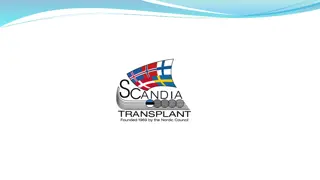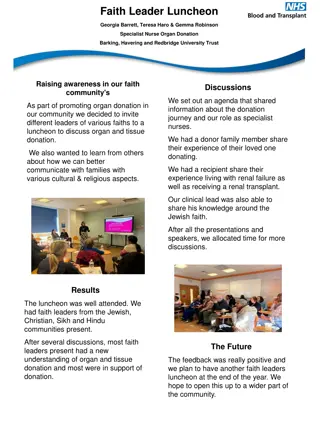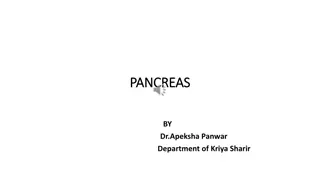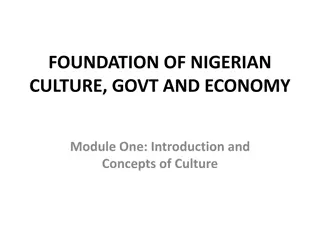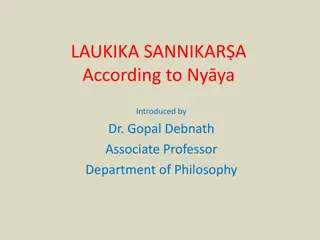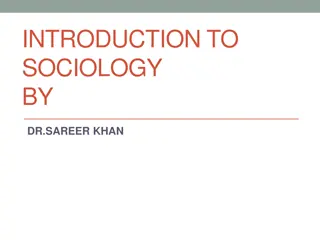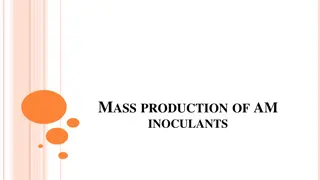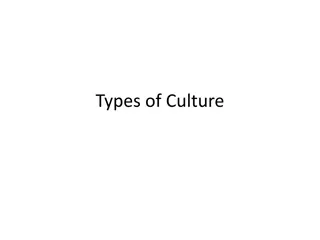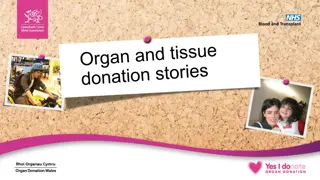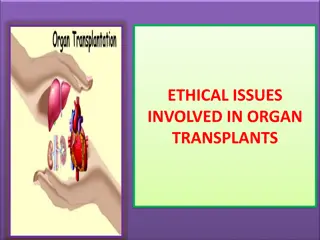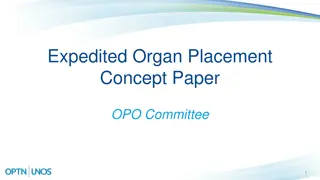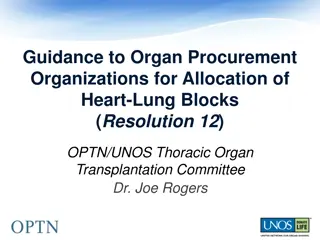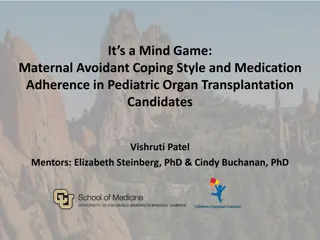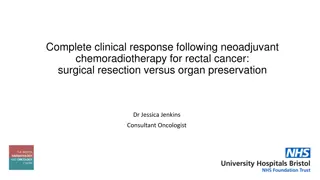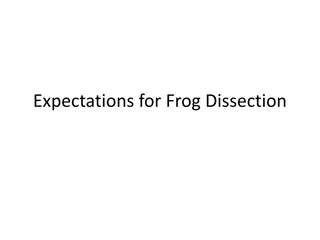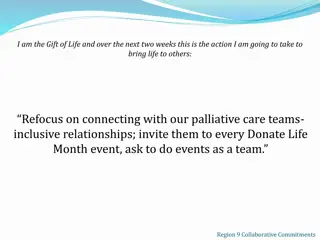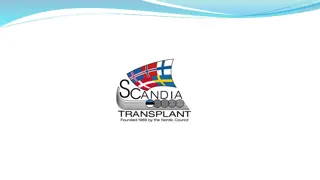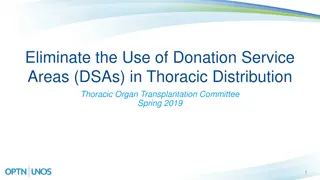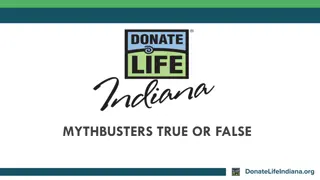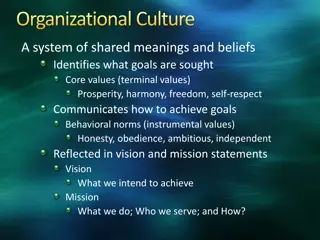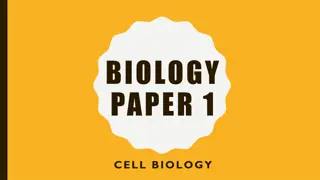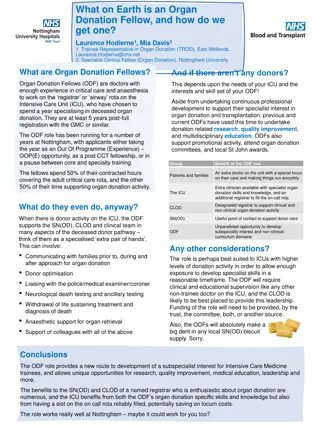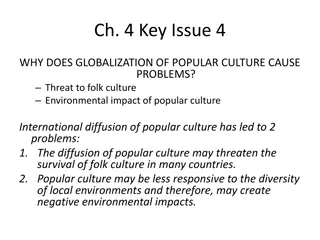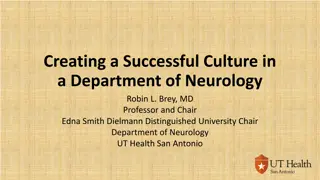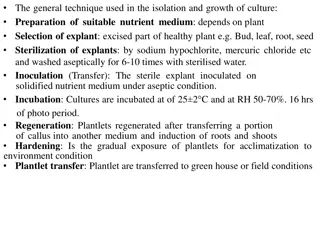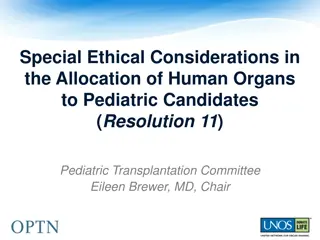Understanding Shock: Causes, Symptoms, and Stages
Shock is a critical condition caused by an imbalance between cellular oxygen supply and demand, leading to organ dysfunction. Compensatory responses include increased heart rate, vasoconstriction, and hormonal adjustments. Recognizable features of shock include tachycardia, hypotension, cool clammy
3 views • 27 slides
Should We Allow a Market for Transplant Organs?
Analyzing the dilemma of organ shortages in the US, this content explores the ethical dimensions of creating a market for transplant organs. Through discussions on economics, ethics, and decision-making processes in allocating scarce organs, it delves into the complexities of determining who should
0 views • 22 slides
Understanding Organ Donation in Hong Kong
Explore the various aspects of organ donation in Hong Kong, including suitable organs for donation, living and cadaveric donation processes, low donation rates, common misconceptions, and how to register as an organ donor through the Centralised Organ Donation Register. Discover the opt-in and opt-o
3 views • 28 slides
Scandiatransplant Activities and Awards in 2023
Scandiatransplant is the organ exchange organization serving Denmark, Finland, Iceland, Norway, Sweden, and Estonia. They facilitate kidney, liver, thoracic, pancreas, and islet transplantations. The organization aims to maintain transparency and ethical practices while operating a common waiting li
2 views • 45 slides
Engaging Our Community: Organ Donation Initiatives and Success Stories
Two impactful initiatives in the healthcare sector aimed at promoting organ and tissue donation within communities are highlighted. The first initiative involves hosting luncheons with faith leaders to educate and raise awareness, resulting in increased support for donation. The second initiative sh
0 views • 4 slides
Comprehensive Overview of Pancreas Function and Structure
Pancreas is a vital organ in the abdomen with dual exocrine and endocrine functions. As an exocrine organ, it secretes digestive enzymes and bicarbonates into the duodenum for food breakdown. In its endocrine role, the pancreas regulates blood sugar levels by secreting insulin, glucagon, somatostati
1 views • 16 slides
Understanding Nigerian Culture, Government, and Economy: Module One
Delve into Module One of the course on Nigerian culture, government, and economy with a focus on the Introduction and Concepts of Culture. Explore definitions of culture, various types of culture, characteristics, importance, related concepts, levels, and differences between culture and ethnic group
1 views • 31 slides
Fascinating Facts About Iguanas: From Skills to Survival
Iguanas, part of the Iguanidae family, are unique reptiles with special skills like tree climbing and predator evasion. They face threats due to human consumption and environmental hazards, such as oil spills for marine iguanas. Their sensory organ, Jacobson's organ, helps them navigate their surrou
0 views • 10 slides
Effectiveness of Steroids in COVID-19 Treatment: Insights from Recent Studies
Recent studies delve into the impact of different steroids on mortality and organ support in hospitalized COVID-19 patients. The use of dexamethasone showed a significant reduction in 28-day mortality, especially in patients requiring oxygen support. On the other hand, the REMAP-CAP trial assessed t
1 views • 6 slides
Understanding Plant Tissue Culture: Methods and Requirements
Plant tissue culture involves the in-vitro culture of plant explants under aseptic conditions, covering cell, organ, and suspension cultures. This process, pioneered by German botanist Gottlieb Haberlandt, relies on the totipotency of plant cells. Key requirements include laboratory organization, su
0 views • 18 slides
Understanding Perception in Nyaya Philosophy: An Introduction to Laukika Sannikara
Nyaya philosophy defines perception as knowledge arising from the contact between a sense organ and its object, known as Sannikara. This contact can be direct or indirect, leading to various kinds of Sannikaras such as Sayoga, Sayokta-samavya, Samaveta-samavya, Samavya, and Viśeṣa-viśeṣabhāva
2 views • 10 slides
Understanding Culture in Sociology: Key Concepts and Definitions
Culture is the cornerstone of society, distinguishing humans from animals and shaping our social lives. Sociologists define culture as the shared values, practices, norms, and beliefs that govern our interactions and behaviors. This comprehensive guide explores the non-material aspects of culture, i
1 views • 30 slides
Overview of Cell Culture Methods and Importance in Research
Introduction to the principles of cell culture, including tissue culture, organ culture, and cell culture methods. Discusses the advantages and disadvantages of each technique and highlights the need for cell culture in research for studying cellular behavior and large-scale production of cell mater
3 views • 45 slides
Methods for Mass Production of AM Inoculants
Techniques for mass production of arbuscular mycorrhizal (AM) inoculants involve in vivo culture on green house plants, spore production with antibiotic treatment, field growth monitoring, and in vitro/axenic culture techniques. Solutions include using living roots, inert substances like vermiculite
1 views • 12 slides
Understanding Popular Culture: Classification and Impact
General classification of culture includes Popular, High/Elite, Low/Subculture, Primary & Secondary, Folk, and Co-Culture. Popular culture, shaped by mass media, encompasses ideas, attitudes, and phenomena favored by society. It influences daily life, with examples like styles of dress, slang, and s
0 views • 16 slides
Organ Donation Awareness and Education Activities
Explore the importance of organ donation through engaging activities, such as quizzes on organ and tissue donation facts and myths. Learn about the various organs and tissues that can be donated, the significance of registering on the NHS Organ Donor Register, and the impact of organ donation in sav
1 views • 26 slides
Ethical Issues in Organ Transplants
Organ transplantation involves the moving of organs from one body to another to replace damaged or absent organs. The process includes cadaveric and living organ donations, with various transplantable organs like lungs, kidneys, heart, and more. There are ethical issues surrounding organ donation de
0 views • 16 slides
Expedited Organ Placement Concept Paper - Addressing Critical Transplant System Issues
This concept paper outlines a proposal to address key challenges in the current organ transplant system, such as lack of transparency and consistency in organ placement. The focus is on developing an expedited placement system with specific triggers and qualifications to improve access to organs for
0 views • 9 slides
National Histopathology Service for Organ Retrieval and Transplantation - Audit Findings
The need for a national histopathology service for organ retrieval and transplantation is highlighted, with a focus on the importance of histopathological analysis in assessing donor organ quality and identifying lesions for further investigation. The audit findings show the incidence of urgent hist
0 views • 17 slides
Enhancing Heart-Lung Allocation Policy for Organ Transplantation
This project focuses on improving the allocation of heart-lung blocks for organ transplantation by providing clear guidelines to Organ Procurement Organizations (OPOs). The goal is to ensure consistent practices among OPOs across the country, promoting fairness and efficiency in organ allocation. Th
0 views • 11 slides
Proposed NRC Safety Culture Policy Statement Overview
This document provides an overview of the proposed Nuclear Regulatory Commission (NRC) Safety Culture Policy Statement presented by Eric Fries, the Safety Culture Program Manager. It covers topics such as NRC's mission, responsibility, safety culture background, draft policy statement, current statu
0 views • 24 slides
Understanding Maternal Avoidant Coping and Medication Adherence in Pediatric Organ Transplant Candidates
Maternal avoidant coping styles may impact medication adherence in pediatric organ transplantation candidates. Challenges in the field include organ shortage, patient non-adherence, and identifying health risk factors for effective organ allocation. Parents' coping behavior factors of stress include
0 views • 14 slides
Comparison of Surgical Resection vs. Organ Preservation after Neoadjuvant Chemoradiotherapy for Rectal Cancer
In the management of rectal cancer, the debate between surgical resection and organ preservation after neoadjuvant chemoradiotherapy is ongoing. While surgical resection is highly effective, the watch-and-wait strategy offers benefits such as avoiding permanent stomas and improving quality of life.
1 views • 14 slides
Frog Dissection Expectations and Procedures
Instructions for a frog dissection including preparation, tool usage, cutting techniques, organ exploration, and cleanup procedures. Students are guided on safety measures, dissection methods, organ identification, and proper cleanup steps after the activity. Detailed visual aids accompany each step
0 views • 6 slides
Modernizing Organ Donation Laws: The Uniform Anatomical Gift Act of 2006
The Uniform Anatomical Gift Act (UAGA) of 2006 aims to enhance the donation process by introducing new definitions, emphasizing personal autonomy, and providing clearer rules. It addresses the need for uniformity, updates to reflect current practices, and modernizes the Act to ensure a smoother orga
0 views • 14 slides
Plant Tissue Culture Methods for Growth and Reproduction Study
Plant tissue culture methods such as root tip culture, shoot-tip culture, leaf culture, flower culture, and anther and pollen culture allow for the study of growth, reproduction, and genetic variations in plants. These techniques involve culturing various plant parts under sterile conditions to inve
1 views • 20 slides
Understanding Organogenesis in Plant Tissue Culture Techniques
Plant regeneration through tissue culture techniques such as organogenesis plays a vital role in micropropagation and organ production. Factors affecting organogenesis include donor plant growth, culture medium, growth regulators, and environmental conditions. Chemical regulation and the use of epid
0 views • 10 slides
Ethical Considerations in Organ Donation for Neurologically-Aware Patients
This information highlights the process of honoring the desire of neurologically-aware patients to donate organs after circulatory death. It discusses the referral, legal authorization, triggers for consideration, and ethical aspects involved in approaching and discussing organ donation with the pat
0 views • 15 slides
Bringing Life Through Organ Donation: Two-Week Action Plan
Over the next two weeks, the Gift of Life aims to refocus on connecting with palliative care teams, educate ICU staff on the importance of early referrals, raise awareness in the Caribbean community about organ donation, coordinate information sessions with OPO liaisons, and encourage colleagues to
0 views • 64 slides
Overview of Scandiatransplant Activities and Purpose
Scandiatransplant is the organ exchange organization for Denmark, Finland, Iceland, Norway, Sweden, and Estonia, serving a population of about 29.1 million. Its purpose is to facilitate organ exchange transparently and ethically among its member hospitals. The organization covers various transplanta
0 views • 45 slides
Proposal to Remove Donation Service Areas in Thoracic Organ Transplantation
The proposal aims to ensure compliance with regulations by eliminating Donation Service Areas (DSAs) in thoracic organ allocation policies. The suggested solutions involve replacing DSAs with a 250 NM distance from the donor hospital, removing language allowing prioritization of sensitize heart cand
0 views • 10 slides
Organ Offer Management at Keck USC Transplant Institute
Keck USC Transplant Institute is a multi-organ transplant center with a dedicated team managing organ offers. The team structure includes RN-Transplant Coordinators, Call Team Managers, and Donor Allocation Specialists. They handle a range of tasks from reviewing offers with physicians/surgeons to p
0 views • 18 slides
Organ Donation and Transplantation Myths True or False
Explore common myths and facts about organ donation and transplantation through a fun true or false game. Learn the truth behind misconceptions like who can be a donor, the possibility of brain transplants, where to register as a donor, fairness in organ allocation, and the impact on funeral arrange
1 views • 14 slides
Understanding Organizational Culture and Its Impact on Business Success
Organizational culture encompasses shared beliefs, values, and behaviors within a company. It influences goal-setting, strategies, and employee actions. The transmission of culture is vital for aligning values with business practices. Culture matters for client relations, differentiation, and managi
0 views • 17 slides
Cell Biology Overview and Organ Systems in Biology Paper 1
The Biology Paper 1 content covers topics such as cell specializations, cell division, organelles, enzyme functions, and organ systems including the cardiovascular system. It discusses key concepts like stem cells, mitosis, diffusion, osmosis, active transport, and various cell components such as nu
0 views • 8 slides
Understanding the Role of Organ Donation Fellows in Intensive Care Units
Organ Donation Fellows (ODFs) are experienced doctors specializing in deceased organ donation, spending time on the ICU rota and supporting organ donation activities. They assist in donor optimization, communication with families, and organ retrieval, benefiting both ICU patients and the healthcare
0 views • 4 slides
Challenges of Globalization in Popular Culture
Globalization of popular culture presents challenges such as the threat to folk culture and negative environmental impacts. Rising incomes lead to a shift from folk to popular culture, affecting traditional values and clothing symbolism. The adoption of Western clothing in Middle Eastern countries f
0 views • 12 slides
Cultivating a Successful Culture in Neurology Department
Importance of culture in a neurology department highlighted by Dr. Robin L. Brey. Emphasis on how culture trumps strategy and the role of leaders in maintaining a positive culture. Examples and insights on how culture influences decision-making and behavior. Attributes of a successful culture and ho
0 views • 21 slides
Plant Tissue Culture Techniques: Isolation and Growth
Plant tissue culture involves preparing a suitable nutrient medium, selecting healthy plant explants, sterilizing them, inoculating on solid medium, incubating under controlled conditions, inducing regeneration, and hardening before transferring to greenhouse or field. Various types of cultures can
0 views • 20 slides
Ethical Considerations in Pediatric Organ Allocation
Addressing the lack of an ethical framework for pediatric organ allocation, this project aims to provide evidence-based support for prioritizing pediatric candidates. By collaborating with experts and committees, the goal is to establish a permanent framework that respects ethical and clinical judgm
0 views • 11 slides



